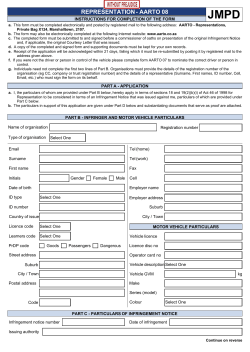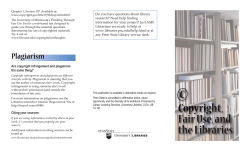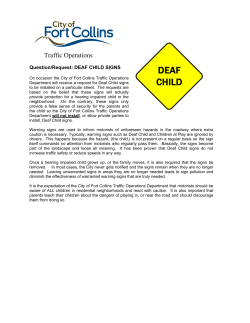
Insert for website.cdr
AARTO for YOU n ptio 0500 e c Re 285 87 +27 re ent 861 C l Cal 122 7 86 +27 We b w.rt site ia.c o.za E info mai @rt l ia.c o.za ww s res d d A , ical Road s y r Ph ekke l Park B erfal t Wa Offices 253 or Flo Close t s 1 ick d How idran M T @rt witter ia_a arto Fac Rtia ebook -Aa rto Will the real RTIA please stand T he Road Traffic Infringement Agency (RTIA) is responsible for the fair adjudication of traffic infringements under the Administrative Adjudication of Road Traffic Offences (AARTO) Act to discourage road users from breaking traffic laws and encourage good driver behaviour. outstanding obligations; as well as authorising enforcement orders to persuade motorists to pay penalties. The AARTO Act makes provision for the demerit points system and the ultimate cancellation of licences of habitual road traffic offenders. This is all to be effected at national roll-out of AARTO The RTIA seeks to protect the rights of road users which will be announced by the Minister of by ensuring that they understand such rights and Transport. obligations, in terms of the AARTO Act by undertaking community education and Currently the RTIA is preparing to roll out the AARTO throughout the country so that all road awareness programmes. traffic authorities operate using the same Day to day operations of the RTIA include procedures. adjudicating representations by motorists and vehicle owners; to remind motorists of their AARTO a South African first A ARTO is required to restore law and order Ÿ AARTO is aimed at promoting driver in the road traffic arena. Road crashes behaviour, respect and consideration of other happen as a result of road users not drivers, vehicles and road users. abiding by the rules of the road, reckless, negligent, inconsiderate and aggressive driver Ÿ AARTO procedures are needed to promote road safety through the effective and speedy behaviour. consideration of traffic violations and to Ÿ The AARTO process starts with the traffic enforce the payment of traffic penalties. officer observing a traffic violation and issuing an infringement notice. Ÿ After having received such notice, the infringer must select any one of the options provided within a period of 32 days. Ÿ These options include: payment of the penalty; arranging to pay in instalments; elect to be tried in court; submit a representation or nominate the driver of the vehicle at the time the infringement was committed. The National Contravention Register or NCR is part of the national traffic information system that holds all the infringement and offence information of every individual. a ake tion m To senta ail em @ re rep u can tions yo senta .za re co rep rtia. How to speak AARTO The Administrative Adjudication of Road Traffic Offenses (AARTO) Act promotes road traffic quality by providing a scheme to discourage road traffic contraventions, facilitate adjudication of road traffic infringements and implement a points demerit system. An infringement is the failure to observe the law. An infringer is a person who is alleged to have committed an infringement or of breaking the law. An infringement notice is a notification sent or given to an alleged infringer. An issuing authority is the traffic law enforcement authority or department that issues the infringement notice. This includes National, Provincial and Local traffic authorities. A penalty is the amount payable by an infringer for an infringement. A representation officer is a person appointed by the RTIA to consider representations when an alleged infringer elect to make a representation. A representation is when an infringer challenges the infringement notice and gives reasons why he/she cannot be held accountable for that infringement. page 1 The RTIA Registrar, Mr Japh Chuwe This means systems are currently being tested and perfected before the AARTO national roll out so that road users do not experience frustrations at traffic centres.The pilot phase has given RTIA an opportunity to iron out any system glitches so that motorists get world class service. S ince its inception four short years ago, the RTIA has been making striders in road safety and safe guarding the rights of motorists. As the home of the AARTO Act we hold motorists accountable for their actions on the road thus creating a safer environment for all road users. The country continues to bleed from road crashes, yet, very little or not enough is being done to curb these senseless deaths. The RTIA, custodian of the AARTO Act with its inherent points demerit system, believes that this Act will revolutionise road safety and management of road traffic infringements in South Africa and the Southern African Development Community. THE ROAD TO SUCCESS IS ALWAYS UNDER CONSTRUCTION We were under no illusions about the difficulties we would face in implementing AARTO particularly because it is human nature to view change with suspicion but the time had come to address non-compliance to road traffic laws holistically. In so doing the root causes of deviant behaviour on our roads would be addressed. Most motorists view traffic laws as a way to collect revenue rather than to increase road safety, and this is one of the major challenges RTIA faces - showing the motorists that road traffic laws are there to protect. These perceptions are being addressed through the RTIA’s communication programmes. Technology has advanced extensively in the past ten years since the AARTO Act was promulgated and that has made communication more convenient and cheaper. Recognising this, the RTIA - through the Department of Transport tabled the AARTO Amendment Bill that seeks to remedy deficiencies in the Act including cost effective ways of serving courtesy letters and other documents. MOVING FORWARD South Africans must recognise that roads are a common and shared benefit to be enjoyed by all, from motorists to cyclists and pedestrians; by obeying all traffic laws. As we travel to various destinations on a daily basis let us all do our best to arrive at our destinations safely. To all drivers of public transport vehicles and private vehicles remember, you are carrying the most important and valuable assets that our country has - its people. Yours is to deliver them safely to their various destinations. As such AARTO must be prioritised as a new path to address road user behaviour because it was designed to encourage compliance with road traffic laws as a solution to reduce crashes and deaths. Road safety challenges can be linked directly to the culture of non-compliance brought about by the fact that less than 20% of road users pay for outstanding infringements without consequence, creating the belief that Let us accept road safety as the responsibility of motorists can get away with dangerous AARTO brings with it uniformity in fines and each and every one of us and stop the reckless behaviour. affords all motorists access to traffic information carnage on our roads. wherever they may be. YOU RECEIVE AN AARTO INFRINGEMENT EITHER ON THE SIDE OF THE ROAD FROM A TRAFFIC OFFICER OR IN THE POST. THE CLOCK STARTS TICKING ON THE AFTER RECEIVING AN INFRINGEMENT NOTICE YOU HAVE 32 DAYS TO: Using your infringement notice as a reference number pay the 50% penalty at: Ÿ ABSA Ÿ FNB Ÿ Standard Bank or Ÿ South African Post Office Ÿ www.paycity.co.za Ÿ Municipal Offices and Drivers Licence Testing Centres. Nominate a driver or person in control of the vehicle at the time the infringement took or Lodge a representation with the RTIA where the RTIA will then fairly assess the dispute and give an outcome. or Arrange to pay your penalty or fine in installments through RTIA on: representations@rtia.co. Elect to be tried in court. or AFTER THE FIRST 32 DAYS, YOU WILL RECEIVE A COURTESY LETTER IF YOU DID NOTHING ABOUT THE INFRINGEMENT: Pay the full amount and admin fee at any designated pay points. When making any payments all you need is the correct infringement number as a reference. Lodge a representation with the RTIA for a fair assessment of the dispute. or Elect to be tried in court. or or Arrange to pay your penalty in installments through the RTIA on: representations@rtia.co.za or +27 87 285 0500 AFTER THE FIRST 32 DAYS, YOU WILL RECEIVE AN ENFORCEMENT ORDER IF YOU DID NOTHING ABOUT THE INFRINGEMENT: Pay the full amount and admin fee at any designated pay points by using your correct infringe- ment number as a reference. page 2 or Elect to be tried in court. or Apply to have an enforcement order revoked or cancelled. The talented AARTO WHY THE CARROT he number of deaths on South African roads has become untenable. The fines imposed on motorists to encourage compliance with traffic laws go unpaid, even with the threat of a criminal record, traffic laws are still ignored. The AARTO Act has been introduced to address some of these issues. T The procedures allow for payment at a discounted amount within the first 32 days of receiving the penalty; the nomination of the driver, if you were not the driver at the time of the violation; make a representation for the penalty to be cancelled; arrange to pay in installments; or choose to go to court. For the first time in South Africa, traffic violations will be dealt with administratively which simply means These are several elective options available to you in the AARTO process to explore. HOW DO REPRESENTATIONS WORK? An infringer who has been served with an infringement notice is alleged to have committed a traffic infringement and may make representation(s) with respect to that infringement to the RTIA. If the infringer has not received acknowledgment of receipt from the RTIA within 21 days from the date on which the infringer submitted representation(s), the infringer must notify the RTIA. Representations can only be submitted for infringements still in courtesy letter stage. The RTIA should inform an infringer of the decision of the representation officer after the stipulated time frame of 21 days. An impartial representation officer will duly consider the matter and conduct investigations to verify the facts if necessary. He/she will then allow the representation if there are reasonable grounds or deny the representation if there are none. that there will be no prosecutors or courts involved unless a motorist has committed an offence or choose to be tried in court. An administrative process also means no criminal records are attracted by motorists should the outcome of the administrative process be unfavourable for them. TOGETHER WE STAND Imagine a time where all appeals and complaints with regards to traffic violations are dealt with in a standardised way from a central point. A time where the merits of each traffic violation case are carefully considered and motorists who have violated the law are penalised. The AARTO Act introduces standardised procedures and penalties to deal with traffic violations. As a motorist the procedures gives you, without having to go to court, the opportunity to present your side of the story in a case where you believe any penalty received has no basis or the violation you are penalised for was a result of circumstances beyond your control. THE STICK If the representation is allowed the RTIA will cancel the infringement notice and no fees or penalties will be payable by the infringer. Traffic violations would further be punished by the allocation of demerit points at a point of If the representations are rejected there will finalisation of the processing of the penalty. The be a administrative fee added to the original penalty amount as charged. The infringer demerits ensures that those who can afford to may then elect to be tried in court, arrange pay penalties as and when they receive such, do not only suffer pecuniary loss but may also have to settle the full amount in one payment or in installments or nominate the applicable their driving licenses suspended or cancelled. driver. WHY DO WE NEED AARTO creates a seamless traffic infringement administration process. This means information will be readily available from any traffic department or centre you choose to access as a motorist. AARTO provides infringers with the convenience of paying standardised fines anywhere in the country including all major commercial banks. This means that there are no more different penalties for similar infringements across the country. AARTO introduces new technologies and convenience in the traffic management sector whereby there is one central database in the form of the National Contraventions Register (NCR) for all infringements and penalties irrespective of where such an infringement has been issued within the country. Representions can be sent to RTIA via: Postal address: Private Bag X112, Halfway House, 1685 E-mail: representations@rtia.co.za Hand delivery: Bekker Road, Waterfall Park Offices, 1st Floor, 253 Howick Close, Midrand This database addresses all the traffic needs of a motorist including checking your infringement status. The carrot and stick principles within AARTO would foster voluntary compliance to traffic laws by road users. page 3
© Copyright 2024









